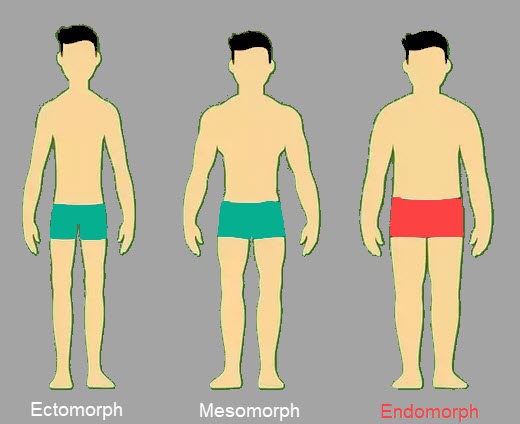If you’ve thought of dieting, losing weight, or getting healthy, you most likely heard of intermittent fasting. It is considered a great diet both for those who want to lose some stubborn pounds, but also for those who just want to get healthy or even manage conditions like type 2 diabetes and insulin resistance. It is known there are also some conditions when fasting isn’t recommended or simply doesn’t work, but what about the different body types? For instance, does intermittent fasting work for endomorphs?
It does. Intermittent fasting works whether you are an endomorph, mesomorph, or ectomorph. The problem with endomorphs, comes from the fact that their metabolism is usually slower, and they may be more sensitive to carbs, and more prone to insulin resistance. While intermittent fasting can help this issue, if it is not done carefully, it could bring more problems than benefits.
Let’s dive deeper into this topic and explore when intermittent fasting helps endomorphs and what you should avoid doing if you don’t want this diet to backfire.
Does intermittent fasting work for endomorphs?
What is an endomorph?
Before we dive deeper into intermittent fasting for endomorphs, let’s see what is different about this type of body. In simple terms, an endomorph body is one with a higher percentage of fat and a lower percentage of muscle. Most of the time, endomorphs have a harder time losing weight.
They aren’t necessarily obese, but they gain weight easily. They also tend to be more sensitive to certain types of foods. Carbs for instance are turned quickly into sugar, which then risks transforming into the dreaded belly fat.
For this reason, endomorphs need to pay close attention both to how much they eat but also what they eat.
Intermittent fasting for endomorphs
Intermittent fasting can be a great place to start. You’re cutting out calories easily and you’re helping your body process insulin better, so carbs won’t be as detrimental.
However, if you’re not careful, fasting can easily backfire and make you gain weight. Intermittent fasting is more of a lifestyle than a diet in and of itself. As a result, you don’t have a list of recommended foods or a certain number of calories to eat. According to the type of fasting you choose, you have hours or days where you’re not allowed to eat. For the rest of the time, you decide what and how much you eat.
This is where problems can arise for endomorphs. If you eat a lot of carbs during your eating window or overeat frequently, you might still end up gaining weight despite fasting. For intermittent fasting to work, you’ll need to pay attention to what you eat and make sure you don’t try to compensate for the hours of fasting by overeating.
Best types of intermittent fasting for endomorphs
The 16/8 method
The 16/8 method or the time-restricted method is the best for most endomorphs for several reasons. First of all, it promotes autophagy, which helps cells renew and it boosts your metabolism. It is fairly easy for most people, as you’re essentially skipping one meal each day. Women and people prone to hypoglycemia may find it easy to start fasting only 14 hours instead of 16, which should allow an extra snack in your day.
The risk of over eating still exists, and you’re the only one who can control it, just like you need to make sure the foods you eat are healthy and good for your body. The good news is, this method shouldn’t slow down your metabolism, like other, more restrictive fasting methods could.
The 5:2 method
In this method, you fast 2 days a week and eat normally during the other 5. In the 2 days of fasting, you can eat around 500 calories if you’re a woman, and 600 if you’re a man. In other words, you’re limiting yourself to one meal a day. You may also split it into multiple snacks, whichever feels easier for you. The 2 fasting days shouldn’t be consecutive and if possible, you should avoid intense exercise as well.
As long as you don’t overeat during the 5 days, you’re at an overall weekly caloric deficit, which should eventually lead to weight loss. Some say the severe caloric restriction during the 2 fasting days could slow down your metabolism, something endomorphs will want to avoid. However, because the 2 days aren’t consecutive, this issue could be avoided altogether.
Is intermittent fasting good for endomorphs?
Yes, intermittent fasting is helpful for endomorphs. Because they have a harder time losing weight, many endomorphs end up trying severe calorie-restriction diets that can end up damaging their metabolism in the long run.
Intermittent fasting is a more gentle and natural way of restricting calories. On top of that, fasting with the 16/8 method, for instance, you get more benefits including reduced insulin resistance, lower risk of type 2 diabetes and heart disease, and more.
Even though it doesn’t come with food recommendations, fasting also makes you more aware of what you’re eating. Especially once your body adjusts and you don’t feel as hungry during your fast, you’re more likely to pay attention to what you’re eating. Plus, if you don’t want to give up all your favorite foods, this diet helps you with that. All you need to do is, skip a meal, if you’re following the 16/8 method for instance, and eat the other meals as you normally would. Even if those foods aren’t the healthiest, you’ll still be at a caloric deficit and will start losing weight.
To sum up
If you came here wondering: ‘does intermittent fasting work for endomorphs?’ the answer for you is yes. Intermittent fasting is great for those who find it difficult to lose weight with other diets, those who struggle with insulin resistance, or those with slower metabolisms. Pick your method carefully and be sure to eat a healthy diet and avoid overeating during your eating window and you will start seeing results.

